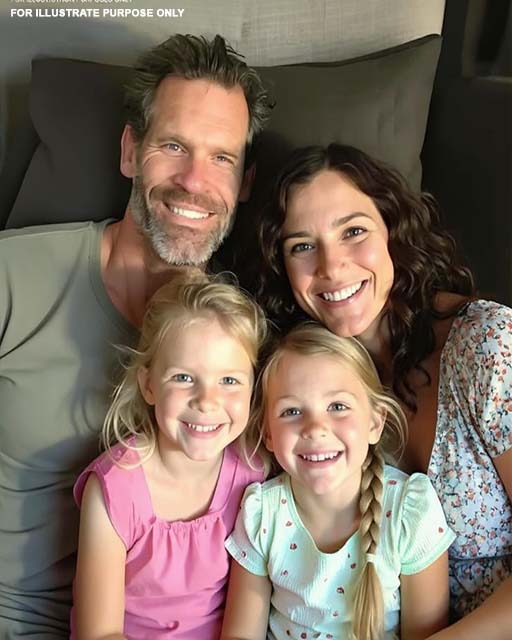The Secret in the Basement
When I married Rachel, I knew I was saying “yes” to more than just her—I was stepping into a life with her two young daughters. From the outside, it all seemed perfect. Sophie and Mia were sweet and spirited, and Rachel carried a kind of quiet grace that made everything around her feel calmer, lighter.
Our home together wasn’t brand new, but it was full of charm—polished hardwood floors, cozy corners, and the ever-present scent of cinnamon candles drifting through the air. It felt like a home that had been lived in and loved.
Except for one place.
The basement.
At first, it was just a door at the end of the hallway—painted the same neutral cream as the walls, blending in like it was trying not to be noticed. But something about it always pulled at the edge of my awareness. Maybe it was the way Sophie would glance at it when she thought no one was looking. Or how Mia’s giggles would die down the moment she got near it.
Rachel never brought it up. If she noticed the tension around it, she never said.
One evening, as we were setting the table, she called out, “Ethan, can you grab the forks?”
I was mid-rummage in the drawer when Sophie wandered in, studying me with a thoughtful look.
“Do you ever wonder what’s in the basement?” she asked.
I chuckled, maybe too quickly. “Not really. Probably just old tools or spiders.”
She tilted her head and drifted away.
Later, during dinner, Mia dropped her spoon. As I bent down to grab it, she whispered, “Daddy doesn’t like loud noises.”
I froze. “What?”
She just smiled and climbed back into her chair like nothing had happened.
Rachel had never said much about her ex-husband. All I knew was that he was “gone.” I never pushed for more details. Maybe I should have.
A few days later, I noticed Mia drawing at the table. I leaned over to take a look.
“Who’s this?” I asked, pointing at the four stick figures.
“That’s me, that’s Sophie, that’s Mommy,” she explained, carefully coloring them in.
“And who’s that one?” I pointed at the last figure, shaded in gray and drawn inside a little box.
“That’s Daddy,” she said matter-of-factly. “He lives in the basement.”
My heart stopped.
That night, after the girls were asleep, I tried to bring it up to Rachel. We were curled on the couch with glasses of wine.
“Have you ever talked to the girls about their dad?” I asked gently.
Rachel’s smile faltered. She looked down at her glass.
“He died. Two years ago. It was cancer—aggressive. I told them he was gone. I didn’t know how to explain it… I thought that was enough.”
Her voice cracked. I didn’t press further.
But the real shock came the next week.
Rachel was working late, and the girls were home sick. I was heating soup when Sophie appeared in the doorway.
“Wanna come see Daddy?” she asked.
Mia followed close behind, clutching her stuffed koala.
I hesitated. “What do you mean, see Daddy?”
“In the basement,” Mia chimed. “He’s downstairs. We go say hi sometimes.”
My pulse quickened. “Girls, you know your daddy isn’t—”
“It’s okay,” Sophie interrupted. “We’ll show you.”
They each took one of my hands and led me to the basement door.
The moment it opened, the air shifted—cool and still, with the kind of quiet that makes you whisper. The old steps creaked as we descended. A single bulb flickered overhead.
And there, in the far corner of the basement, was a small table.
On it sat carefully arranged items: stuffed animals, faded flowers, colorful drawings—and in the middle, a simple urn.
Sophie pointed. “That’s Daddy.”
“Hi, Daddy,” Mia said cheerfully, patting the urn like it was his shoulder.
I knelt beside them, my throat tight.
“You’ve made a beautiful space for him,” I whispered. “I think he’d love this.”
That night, I told Rachel everything. Her face crumpled.
“I didn’t know they remembered,” she whispered, tears streaking her face. “I didn’t want him in the middle of our lives. I thought… I thought that was best.”
“You didn’t do anything wrong,” I said gently. “But maybe it’s time he had a place upstairs. With the rest of the family.”
The next morning, we made space on the living room shelf—right between two family photos. We placed the urn there with fresh flowers and drawings the girls picked themselves.
That evening, Rachel sat down with them and said, “Your daddy’s not just in that urn. He’s in our hearts, in the stories we tell, in the way we love each other.”
Sophie nodded slowly. Mia clutched her koala tight.
“Can we still say hi to him every day?” Mia asked.
“Always,” Rachel whispered. “Every single day.”
From then on, every Sunday evening, we lit a candle next to the urn. The girls would bring their drawings, and Rachel would share a story—about how their dad once burned a cake trying to bake, or how he danced terribly but without shame, or how he laughed so hard he cried.
And I’d sit beside them. Not replacing him. Not taking his place. Just being part of this new life we were stitching together, one memory at a time.
